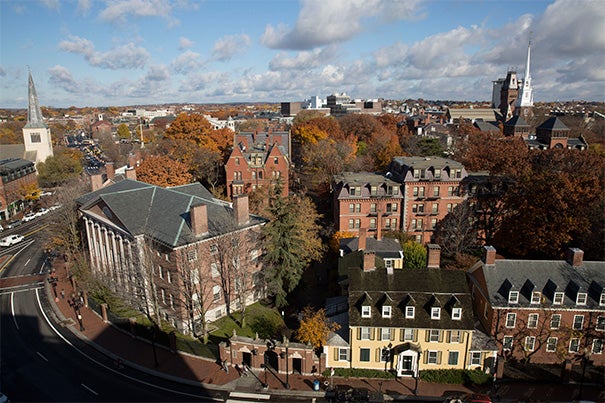
“The Fulbright program provides the type of experience that builds the connections and shared understanding across different cultures and societies that is critical to our collective future,” said Rakesh Khurana, dean of Harvard College. Twenty-two of the 34 winners are from the College, with the remaining from GSAS, HLS, GSD, and GSE.
Kris Snibbe/Harvard Staff Photographer
Crowd of Fulbrights
With 34, Harvard is repeat leader
For the second year in a row, Harvard leads its peers in Fulbright Scholarships, with 34 students ― 22 from Harvard College, nine from the Graduate School of Arts and Sciences (GSAS), one each from the Law School, Graduate School of Education, and the Graduate School of Design — all receiving the prestigious grants to conduct research or teach abroad.
The 2014–2015 class of College winners are: Jayshlyn Acevedo, Vishal Arora, Dipona Bandy, Eric Bersin, Gargi Chaudhuri, Susie Double, Naji Filali, Elena Helgiu, Mai Hunt, Lauren Johnson, Kristine Lee, Signa Mahung, Laura Polding, Raul Quintana, Jesse Sanchez, Laszlo Seress, Leila Shayegan, Nina Sokolovic, Kelly Sullivan, Harper Sutherland, Rebecca Tweedie, and Darshali Vyas.
“I am very proud of these students,” said Harvard College Dean Rakesh Khurana.“The mission of the College is to educate citizens and citizen-leaders for our society. The Fulbright program provides the type of experience that builds the connections and shared understanding across different cultures and societies that is critical to our collective future.
In addition to the winners from the College, GSAS Fulbright winners are Colleen Anderson, Maria Blackwood, Kyrah Daniels, Aditya Dasgupta, Heng Du, Sarah Politz, Michael Thornton, Jessica Tollette, and Ben Williams.
“Our Fulbright winners represent an extraordinary range of topics and countries,” said Xiao-Li Meng, dean of the Graduate School of Arts and Sciences and the Whipple V.N. Jones Professor of Statistics. “We are particularly proud of the fact that more than 50 percent of GSAS applicants won Fulbrights this year.”
Harvard Fulbright Scholarships were also awarded to Harvard Law School’s Grace Nosek; Graduate School of Design’s Simon Battisti, M.Arch ’14; and Graduate School of Education’s Bethany Mulimbi, Ed.D. ’17.
Success in the Fulbright process begins with committed students, said Greg Llacer, director of the Office of Undergraduate Research and Fellowships.
“I think first and foremost we have great applicants,” Llacer said. “They’re being very thoughtful about the research they want to conduct, and because they’re starting in earnest during the spring term of their junior year, we’re able to engage with them early in the process. That has been a very, very successful recipe for us.”
For those interested in applying, Llacer said, the process begins months before the October deadline.
“During the summer they have the opportunity to write drafts of their proposals, and they’re in contact with the House fellowship tutors. Students then meet with our Fulbright Evaluation Committee, which includes faculty and senior administrators who have international experience. They interview the students, who then have a short time to make modest adjustments to their proposals.”
Created by Sen. J. William Fulbright in the late 1940s, the program was intended as a sort of cultural exchange, giving American students and scholars an opportunity to study or conduct research abroad while providing citizens of other countries the chance to do the same in the United States.
The program annually tops 8,000 grants across more than 150 countries. More than 300,000 scholars have participated in the program, with the United States’ total exceeding 114,000.
“I think, especially in the 21st century, our undergrads and graduate students are looking sto become global citizens,” Llacer said. “Fulbright is arguably the ultimate intellectual award that allows you to do that. It’s very gratifying to me that our students are finding that this is an opportunity for them — that’s great to see.”




